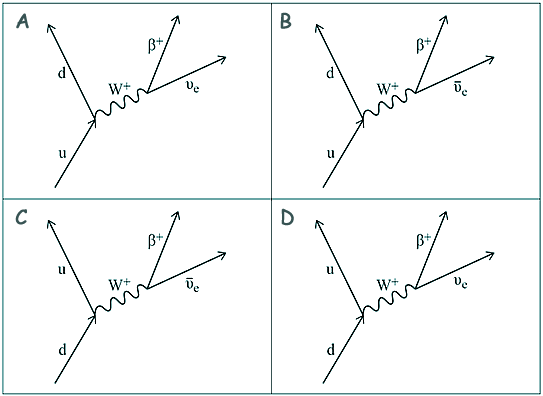Particle Physics Questions : Multiple Choice
Q11.
A CERN detector shows a signal only in the hadronic calorimeter. No signal is observed in the in the tracker, electromagnetic calorimeter or muon chambers). Therefore, this signal is most likely due to a:
A |
pion |
B |
neutrino |
C |
photon |
D |
neutron |
Q12.
The exchange particles carrying the strong nuclear force are the:
A |
photons |
B |
gluons |
C |
gravitons |
D |
w-bosons |
Q13.
Which was the first particle discovered which is still today believed to be elementary, i.e. not made up of further constituents?
A |
electron |
B |
gluon |
C |
photon |
D |
proton |
Q14. Which of the following is not true?
A |
Each meson consists of a single quark and a single antiquark. |
B |
Each baryon consists of three quarks. |
C |
The magnitude of the charge on every quark is 1/3 |
D |
A particle consisting of a single quark has not been observed. |
Q15. Which equation shows the process of annihilation?

Q16. Which of the following is not made of quarks?
A |
kaon |
B |
muon |
C |
neutron |
D |
pion |
Q17. What is the quark structure for antiprotons?

Q18. The equation represents the weak interaction between a negative pion and a proton.
π− + p → Ko + X
What is the charge, baryon number and strangeness of particle X?
|
Charge |
Baryon number |
Strangeness |
A |
0 |
0 |
0 |
B |
0 |
1 |
+1 |
C |
1 |
1 |
–1 |
D |
0 |
1 |
0 |
Q19. Which diagram represents the process of beta-plus decay?

Q20. Two gamma photons are produced when a muon and an antimuon annihilate each other.
What is the minimum frequency of the gamma radiation that could be produced?
A |
2.55 × 1016 Hz |
B |
5.10 × 1016 Hz |
C |
2.55 × 1022 Hz |
D |
5.10 × 1022 Hz |










